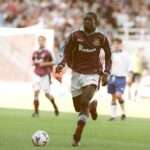As the football season comes to a close, it can be tempting to spend the entire offseason engaging in nothing but leisure activities. But there are obvious consequences for relaxing by the pool all day while eating burgers and hot dogs, or playing video games while gorging on fast food. Getting back into football shape after several months of extreme laziness is absolutely painful.
Every player needs to maintain a challenging offseason workout routine if they plan on staying competitive and making improvements. Staying in shape and improving your abilities during the offseason will have a big payoff when the next season starts. This guide features some tips on how to get the most out of your offseason training efforts.
Make a Plan
Doing anything remotely active in the offseason is beneficial. There are certainly ways to get some exercise while having a good time — hiking or playing pick-up basketball with your friends, for example. However, you should also focus on football-specific training in addition to entertaining, yet physically demanding, activities.
Have a Purpose
The first step in forming an offseason workout plan is to set a goal, aside from just staying healthy. Here are two pointers that will help you figure out how to spend your offseason:
- Talk to your coaches: Part of a coach’s job is to evaluate the players on the team. Chances are good your coach will be able to tell you what you need to improve before the start of next season. If nothing else, your coaches should have a wealth of training and exercise activities you can include into your routine.
- Reflect on your own performance: Every player in the game has something they want to be able to do better. Maybe you had a hard time getting off the line quickly, or were unable to out-run defenders. The offseason is ideal for improving as an individual player; when the season starts, the focus will be on improving as a member of the team.
Regardless of the goals you set, keep in mind one important piece of advice: Specific goals are best. Having really detailed goals makes it easier to evaluate your offseason performance, and also makes it easier to pick the right exercises. Here are a couple of examples of specific goals:
- Instead of “I want to get faster,” your goal should be to shave a half second off of your 40-yard dash time.
- Instead of “I want to get stronger,” your goal should be to increase the maximum weight of your bench press by 25 pounds.
Without setting definitive objectives, it’s extremely difficult to determine if you improved your speed or strength. Having specific goals makes them measurable, and therefore attainable.
Create a Routine
Once you have a better idea about your offseason training objectives, the next step is to create a routine. Putting together a list of exercises is much easier than choosing drills at random, and having a steady, regular routine helps you reach your goals.
There are literally thousands of different exercises from which you can choose. However, not all offseason training exercises are created equally. Focusing on your specific set of goals makes finding the right exercises — and designing your routine — much easier.
Also, it’s important to include a wide variety of exercises, regardless of your specific goals. You don’t want the routine to consist purely of weightlifting exercises, or entirely of running activities. Including a mix of agility, strength, and cardio/endurance exercises results in a balanced workout plan. Here’s an example of such a routine:
- Dumbbell bicep curls: Three sets, 10-15 reps
- Standing military press: Four sets, 6-10 reps
- 15 minutes of jump rope
- Max speed burpees: Five sets of 10 reps; complete sets for time (30 seconds rest in between each set)
- 100 sit-ups
Though some exercises target one muscle group rather than the whole body (like bicep curls), the variety of this routine results in a well-rounded workout session.
Hot Tip: Mix It Up
Having a routine doesn’t mean doing the exact same exercises all the time. While your routine should always correspond to the goals you’ve created, including a variety of exercises prevents your workout from getting boring. It also promotes having a well-rounded workout that targets your muscles in different ways.
The Effort Will Pay Off
Working out in the offseason can be even more difficult than surviving the season itself. There’s no coach out there yelling at you to work, which means all the motivation has to come from within yourself. However, if you truly want to improve as a football player, putting in the time and effort between seasons is necessary.



